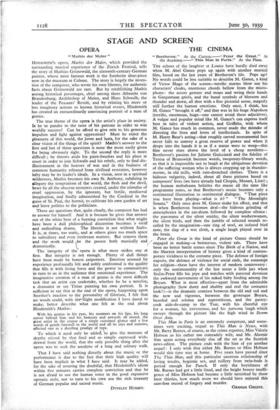STAGE AND SCREEN
" Mathis der Mater "
HINDEMITH'S opera, Mathis der Maier, which provided the
outstanding musical experience of the Zurich Festival, tells the story of Mathias GrUnewald, the sixteenth-century German painter, whose most famous work is the Isenheim altar-piece now in the museum at Colmar. The story is largely the inven- tion of the composer, who wrote his own libretto, for authentic facts about Griinewald are rare. But by establishing Mathis among historical personages, chief among them Albrecht von Brandenburg, Archbishop of Mainz, and Hans Schwalb, the leader of the Peasants' Revolt, and by relating his more or less imaginary actions to known historical events, Hindemith has created an extraordinarily convincing portrait of a man of genius.
The true theme of the opera is the artist's place in society. Is he to pander to the taste of his patrons in order to win worldly success? Can he afford to give rein to his generous impulses and fight against oppression? Must he reject the pleasures of this world, the loves and lusts, for the sake of a clear vision of the things of the spirit? Mathis's answer to the first and last of these questions is none the more easily given for being obviously right. To the second the reply is more difficult ; he throws aside his paint-brushes and his place at court in order to join Schwalb and his rebels, only to find dis- illusionment in the horrors of war and in the foulness of common humanity released from civilised restraints, however lofty may be its leader's ideals. In a vision, seen in a spiritual wilderness, Mathis becomes his own St. Anthony, subduing in allegory the temptations of the world, the flesh and the devil, beset by all the obscene monsters created, under the stimulus of cruel oppression, by the ignorant, but fertile, mediaeval imagination, and finally admonished by the Cardinal in the guise of St. Paul, the hermit, to cultivate his own garden of art and leave politics to the politicians.
These are questions that, quite clearly, the composer has had to answer for himself. And it is because he gives that answer out of the white heat of a burning conviction that what might have been a dull philosophical discussion becOmes 'a vivid and enthralling drama. The libretto is not without faults. It is, at times, too static, and at others gives too much space to subsidiary and even irrelevant matters. But remove them and the work would I be the poorer both musically and dramatically.
The integrity integrity of the opera is what most strikes one at first. But integrity is not enough. Plenty of dull things have been made by honest carpenters. Emotion aroused by experience profoundly felt and nobly confronted is the quality that fills it with living force and the power to communicate. in turn to us in the audience that emotional experience. The imaginative creation of a man of genius is the most difficult task that an artist can undertake, whether he be a novelist, a dramatist or say Titian painting his own portrait. It is sufficient to say that at the end of the opera, happening upon Strether's reaction to the personality of Gloriani, I felt that no words could, with the'slight modification I have dared to make, better describe what one felt at the end about
Hindemith's Mathis : With his genius in his eyes, his manners on his lips, his long career behind him and his honours and rewards all round, the great artist in the course of a single sustained glance and a few words of gentle farewell to the world and all its joys and sorrows, affected one as a dazzling prodigy of type.
To which it need only be added, to give the measure of depths stirred by that final and so simply expressed with- drawal from the world, that the only possible thing after the opera was to seek the anodyne of a long and solitary walk.
That I have said nothing directly about the music or the performance is due to the fact that their high quality will have been implicit in what I have said. It may be added, for the sake of assuring the doubtful, that Hindemith's idiom within five minutes carries complete conviction and that he is not afraid to use the human voice in the good expansive operatic style, nor to turn to his own use the rich treasury
of German popular and sacred music. DYNELEY HUSSEY.










































 Previous page
Previous page